- Home
- David Brin
Infinity's Shore u-5 Page 22
Infinity's Shore u-5 Read online
Page 22
Ever since glorious sunset, he had serenaded the stars and the growling volcano … then a crescent of, sparkling reflections on the face of the largest moon. Dead cities, abandoned in vacuum long ago.
Now Emerson turns east toward a new day. Immersed in warm fatigue, standing on heights protecting the narrow meadows of Xi, he confronts the raucous invasion of dawn.
Alone.
Even the horse-riding women keep inside their shelters at daybreak, a time when glancing beams from the swollen sun sweep all the colors abandoned by night, pushing them ahead like an overwhelming tide. A wave of speckled light. Bitter-sharp, like shards of broken glass.
His former self might have found it too painful to endure — that logical engineer who always knew what was real, and how to classify it. The clever Emerson, so good at fixing broken things. That one might have quailed before the onslaught. A befuddling tempest of hurtful rays.
But now that seems as nothing compared with his other agonies, since crashing on this world. In contrast to having part of his brain ripped out, for instance, the light storm could hardly even be called irritating. It feels more like the claws of fifty mewling kittens, setting his callused skin a-prickle with countless pinpoint scratches.
Emerson spreads his arms wide, opening himself to the enchanted land, whose colors slice through roadblocks in his mind, incinerating barriers, releasing from numb imprisonment a spasm of pent-up images.
Banded canyons shimmer under layer after lustrous layer of strange images. Explosions in space. Half-drowned worlds where bulbous islets glimmer like metal mush-rooms. A house made of ice that stretches all the way around a glowing red star, turning the sun’s wan glow into a hearth’s tamed fire.
These and countless other sights waver before him. Each clamors for attention, pretending to be a sincere reflection of the past. But most images are illusions, he knows.
A phalanx of armored damsels brandishes whips of forked lightning against fire-breathing dragons, whose wounds bleed rainbows across the desert floor. Though intrigued, he dismisses such scenes, collaborating with his rewq to edit out the irrelevant, the fantastic, the easy.
What does that leave?
A lot, it seems.
From one nearby lava field, crystal particles reflect tart sunbursts that his eye makes out as vast, distant explosions. All sense of scale vanishes as mighty ships die in furious battle before him. Squadrons rip each other. Fleet formations are scythed by moving folds of tortured space.
True!
He knows this to be a real memory. Unforgettable. Too exquisitely horrible to let go, this side of death.
So why was it lost?
Emerson labors to fashion words, using their rare power to lock the recollection back where it belongs.
I … saw … this … happen.
I … was … there.
He turns for more. Over in that direction, amid a simple boulder field, lay a galactic spiral, seen from above the swirling wheel. Viewed from a shallow place where few spatial tides ever churn. Mysteries lay in that place, undisturbed by waves of time.
Until someone finally came along, with more curiosity than sense, intruding on the tomblike stillness.
Someone …?
He chooses a better word.
… We …
Then, a better word, yet.
… Streaker!
A slight turn and he sees her, traced among the stony layers of a nearby mesa. A slender caterpillar shape, studded by the spiky flanges meant to anchor a ship to this universe … a universe hostile to everything Streaker stood for. He stares nostalgically at the vessel. Scarred and patched, often by his own hand, the hull’s beauty could only be seen by those who loved her.
… loved her …
Words have power to shift the mind. He scans the horizon, this time for a human face. One he adored, without hope of anything but friendship in return. But her image isn’t found in the dazzling landscape.
Emerson sighs. For now, it is enough to sort through his rediscoveries. A single correlation proves especially useful. If it hurts, then it must be a real memory.
What could that fact mean?
The question, all by itself, seems to make his skull crack with pain!
Could that be the intent? To prevent him from remembering?
Stabbing sensations assail him. That question is worse! It must never be asked!
Emerson clutches his head as the point is driven home with hammerlike blows.
Never; ever, ever …
Rocking back, he lets out a howl. He bays like a wounded animal, sending ululations over rocky outcrops. The sound plummets like a stunned bird … then catches itself just short of crashing.
In a steep, swooping turn, it comes streaking back … as laughter!
Emerson bellows.
He roars contempt.
He brays rebellious joy.
Through streaming tears, he asks the question and glories in the answer, knowing at last that he is no coward. His amnesia is no hysterical retreat. No quailing from traumas of the past.
What happened to his mind was no accident.
Hot lead seems to pour down his spine as programmed inhibitions fight back. Emerson’s heart pounds, threatening to burst his chest. Yet he scarcely notices, facing the truth head-on, with a kind of brutal elation.
Somebody … did … this.…
Before him, looming from the fractured mesa, comes an image of cold eyes. Pale and milky. Mysterious, ancient, deceitful. It might have been terrifying — to someone with anything left to lose.
Somebody … did … this … to … me!
With fists clenched and cheeks awash, Emerson sees the colors melt as his eyes fill with liquid pain. But that does not matter anymore.
Not what he sees.
Only what he knows.
The Stranger casts a single cry, merging with the timeless hills.
A shout of defiance.
Ewasx
THEY SHOW COURAGE.
You were right about that, My rings.
We Jophur had not expected anyone to approach so soon after the Polkjhy slashed an area of twenty korech around our landing site. But now a delegation comes, waving a pale banner.
At first, the symbolism confuses our Polkjhy communications staff. But this stack’s very own association rings relay the appropriate memory of a human tradition — that of using a white flag to signify truce.
WE INFORM THE CAPTAIN LEADER. That exalted stack appears pleased with our service. My rings, you are indeed well informed about vermin! These worthless-seeming toruses, left over from the former Asx, hold waxy expertise about human ways that could prove useful to the Obeyer Alliance, if a prophesied time of change truly has come upon the Five Galaxies.
The Great Library proved frustratingly sparse regarding the small clan from Earth. How ironic then, that we should find proficient knowledge in such a rude, benighted world as this Jijo. Knowledge that may help our goal of extinguishing the wolflings at long last.
What? You quiver at the prospect?
In joyful anticipation of service? In expectation that yet another enemy of our clan shall meet extinction?
No. Instead you shudder, filling our core with mutinous fumes!
My poor, polluted rings. Are you so infested with alien notions that you actually hold affection for noisome bipeds? And for vermin g’Kek survivors we are sworn to erase?
Perhaps the poison is too rife for you to be suitable, even with useful expertise.
The Oailie were right. Without master rings, all a stack can become is a pile of sentimental traeki.
Lark
THE TALL STAR LORD WAS NO LESS IMPOSING IN A homespun shirt and trousers than in his old black-and-silver uniform. Rann’s massive arms and wedgelike torso tempted one to imagine impossible things … like pitting him against a fully grown hoon in a wrestling match.
That might take some of the starch out of him, Lark pondered. There’s nothing fundamentally superior about the guy.
Underlying Rann’s physique and smug demeanor was the same technology that had given Ling the beauty of a goddess. I might be just as strong — and live three hundred years — if I weren’t born in a forlorn wilderness.
Rann spoke Anglic in the sharp Danik accent, with burring undertones like his Rothen overlords.
“The favor you ask is both risky and impertinent. Can you offer one good reason why I should cooperate?”
Watched by militia guards, the star lord sat cross-legged in a cave overlooking Dooden Mesa, where camouflaged ramps blended with the surrounding forest under tarpaulins of cunning blur cloth. Beyond the g’Kek settlement, distant ridges seemed to ripple as vast stands of boo bent their giant stems before the wind. In the grotto’s immediate vicinity, steam rose from geothermal vents, concealing the captive from Galactic instruments — or so the sages hoped.
Before Rann lay a stack of data lozenges bearing the sigil of the Galactic Library, the same brown slabs Lark and Uthen found in the wrecked Danik station.
“I could give several reasons,” Lark growled. “Half the qheuens I know are sick or dying from some filthy bug you bastards released—”
Rann waved a dismissive hand.
“Your supposition. One that I deny.”
Lark’s throat strangled in anger. Despite every point of damning evidence, Rann obstinately rejected the possibility of Rothen-designed genocidal germs. “What you suggest is quite preposterous,” he said earlier. “It is contrary to our lords’ kindly natures.”
Lark’s first response was amazement. Kindly nature?
Wasn’t Rann present when Bloor, the unlucky portraitist, photographed a Rothen face without its mask, and Rokenn reacted by unleashing fiery death on everyone in sight?
It did Lark no good to recite the same point-by-point indictment he had laid out for Ling. The big man was too contemptuous of anything Jijoan to heed a logical argument.
Or else he was involved all along, and now sees denial as his best defense.
Ling sat miserably on a stalagmite stump, unable to meet her erstwhile leader in the eye. They had come seeking Rann’s help only after she failed to read the reclaimed archives with her own data plaque.
“All right,” Lark resumed. “If justice and mercy won’t persuade you, maybe threats will!”
Harsh laughter from the big man.
“How many hostages can you spare, young barbarian? You have just three of us to stave off fire from above. Your intimidation lacks conviction.”
Lark felt like a bush lemming confronting a ligger. Still, he leaned closer.
“Things have changed, Rann. Before, we hoped to trade you back to the Rothen ship for concessions. Now, that ship and your mates are sealed in a bubble. It’s the Jophur we’ll negotiate with. I suspect they’ll care less about visible wear and tear on your person, when we hand you over.”
Rann’s face was utterly blank. Lark found it an improvement.
Ling broke in.
“Please. This approach is pointless.” She stood and approached her Danik colleague. “Rann, we may have to spend the rest of our lives with these people, or share whatever fate the Jophur dish out. A cure may help square things with the Six. Their sages promise to absolve us, if we find a treatment soon.”
Rann’s silent grimace required no rewq interpretation. He did not savor the absolution of savages.
“Then there are the photograms,” Ling said. “You are of the Danik Inner Circle, so you may have seen the true Rothen face before. But I found it a shock. Clearly, those photographic images give Jijo’s natives some leverage. In loyalty to our mast … to the Rothen, you must consider that.”
“And who would they show their pictures to?” Rann chuckled. Then he glanced at Lark and his expression changed. “You would not actually—”
“Hand them over to the Jophur? Why bother? They can crack open your starship any time they wish, and dissect your masters down to their nucleic acids. Face it, Rann, the disguise is no good anymore. The Jophur have their mulch rings wrapped tightly around your overlords.”
“Around the beloved patrons of all humanity!”
Lark shrugged. “True or not, that changes nothing. If the Jophur choose, they can have the Rothen declared anathema across the Five Galaxies. The fines may be calamitous.”
“And what of your Six Races?” Rann answered hotly.
“Each of you are criminals, as well. You all face punishment — not just the humans and others living here, but the home branches of each species, elsewhere in space!”
“Ah.” Lark nodded. “But this we have always known. We grow up discussing the dour odds. The guilt. It colors our distinctly pleasant outlook on life.” He smiled sardonically. “But I wonder if an optimistic fellow like yourself, seeing himself part of a grand destiny, can be as resigned to losing all he knows and loves.”
At last, the Danik’s expression turned dark.
“Rann,” Ling urged. “We have to make common cause.”
He glared at her archly. “Without Ro-kenn’s approval?”
“They’ve taken him far away from here. Even Lark doesn’t know where. Anyway, I’m now convinced we must consider what’s best for humanity … for Earth … independent of the Rothen.”
“There cannot be one without the other!”
She shrugged. “Pragmatism, then. If we help these people, perhaps they can do the same for us.”
The big man snorted skepticism. But after several duras, he brushed the stack of data lozenges with his toe. “Well, I am curious. These aren’t from the station Library. I’d recognize the color glyphs. You already tried to gain access?”
Ling nodded.
“Then maybe I had better have a crack at it.”
He looked at Lark again.
“You know the risk, as soon as I turn my reader on?”
Lark nodded. Lester Cambel had already explained. In all probability, the digital cognizance given off by a tiny info unit would be masked by the geysers and micro-quakes forever popping under the Rimmers.
Yet, to be safe, every founding colony, from g’Keks and glavers to urs and humans, sent their sneakships down to the Midden. Not a single computer was kept. Our ancestors must have thought the danger very real.
“You needn’t lecture a sooner about risk,” he told the big man. “Our lives are the floating tumble of Ifni’s dice. We know it’s not a matter of winning.
“Our aim is to put off losing for as long as we can.”
They were brought meals by Jimi, one of the blessed who dwelled in the redemption sanctuary — a cheerful young man, nearly as large as Rann but with a far gentler manner. Jimi also delivered a note from Sage Cambel. The embassy to the Jophur had arrived at Festival Glade, hoping to contact the latest intruders.
The handwritten letter had a coda:
Any progress?
Lark grimaced. He had no way of telling what “progress” meant in this case, though he doubted much was being made.
Ling helped load beige slabs into Rann’s data plaque — returned for this purpose. Together, the Daniks puzzled over a maze of sparkling symbols.
Books from pre-Tabernacle days described what it was like to range the digital world — a realm of countless dimensions, capabilities, and correlations, where any simulation might take on palpable reality. Of course mere descriptions could not make up for lack of experience. But I’m not like some fabled islander, befuddled by Captain Cook’s rifle and compass. I have concepts, some math, a notion of what’s possible.
At least, he hoped so.
Then he worried — might the Daniks be putting on an act? Pretending to have difficulty while they stalled for time?
There wasn’t much left. Soon Uthen would die, then other chitinous friends. Worse, new rumors from the coast told of hoonish villagers snuffling and wheezing, their throat sacs cracking from some strange ailment.
Come on! he urged silently. What’s so hard about using a fancy computer index to look something up?
Rann
threw down a data slab, cursing guttural phonemes of alien argot.
“It’s encrypted!”
“I thought so,” Ling said. “But I figured you, as a member of the Inner—”
“Even we of the circle are not told everything. Still, I know the outlines of a Rothen code, and this is different.” He frowned. “Yet familiar somehow.”
“Can you break it?” Lark asked, peering at a maze of floating symbols.
“Not using this crude reader. We’d need something bigger. A real computer.”
Ling straightened, looking knowingly at Lark. But she left the decision up to him.
Lark blew air through his cheeks.
“Hr-rm. I think that might be arranged.”
A mixed company of militia drilled under nearby trees, looking brave in their fog-striped war paint. Lark saw only a few burly qheuens, though — the five-clawed heavy armor of Jijoan military might.
As one of the few living Jijoans ever to fly aboard an alien aircraft and see their tools firsthand, Lark knew what a fluke the Battle of the Glade had been — where spears, arbalests, and rifles prevailed against star-roaming gods. That freak chance would not be repeated. Still, there were reasons to continue training. It keeps the volunteers busy, and helps prevent a rekindling of old-time feuds. Whatever happens — whether we submit with bowed heads to final judgment, or go down fighting — we can’t afford disunion.
Lester Cambel greeted them under a tent beside a bubbling hot spring.
“We’re taking a risk doing this,” the elderly sage said.
“What choice do we have?”
In Lester’s eyes, Lark read his answer.
We can let Uthen and countless qheuens die, if that’s the price it takes for others to live.
Lark hated being a sage. He loathed the way he was expected to think — contemplating trade-offs that left you damned, either way you turned.
Cambel sighed. “Might as well make the attempt. I doubt the artifact will even turn on.”
At a rough log table, Cambel’s human and urrish aides compared several gleaming objects with ancient illustrations. Rann stared in amazement at the articles, which had been carried here from the shore of a far-off caustic lake.

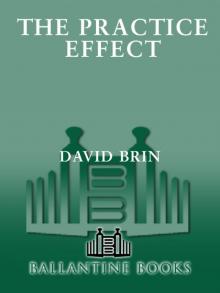 The Practice Effect
The Practice Effect Infinity's Shore
Infinity's Shore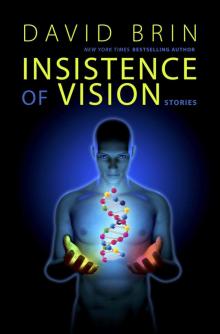 Insistence of Vision
Insistence of Vision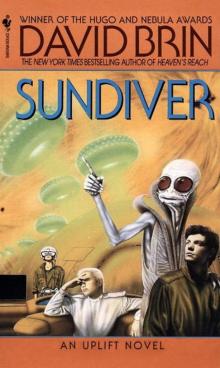 Sundiver
Sundiver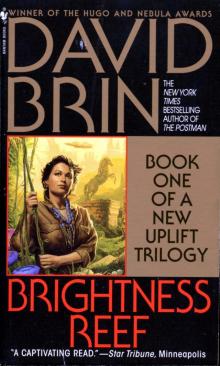 Brightness Reef
Brightness Reef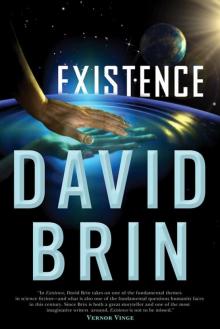 Existence
Existence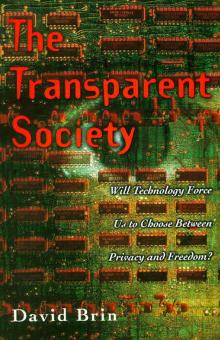 The Transparent Society
The Transparent Society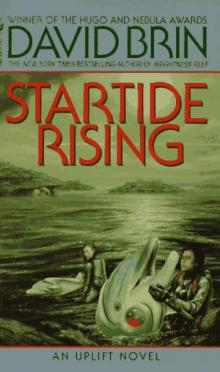 Startide Rising
Startide Rising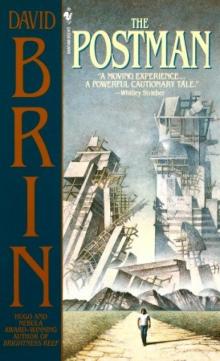 The Postman
The Postman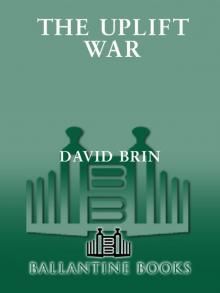 The Uplift War
The Uplift War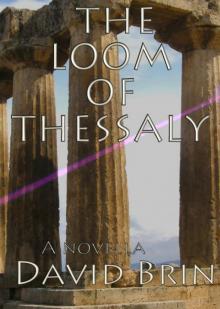 The Loom of Thessaly
The Loom of Thessaly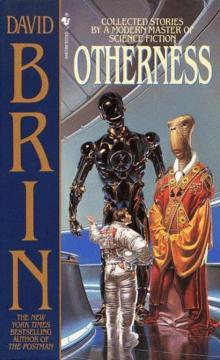 Otherness
Otherness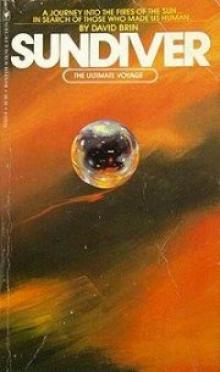 Sundiver u-1
Sundiver u-1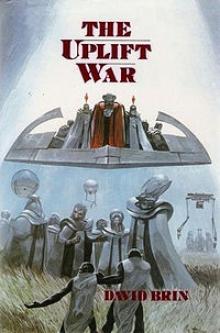 The Uplift War u-3
The Uplift War u-3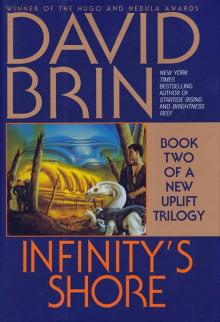 Infinity's Shore u-5
Infinity's Shore u-5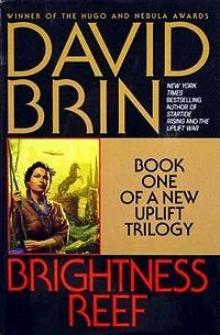 Brightness Reef u-4
Brightness Reef u-4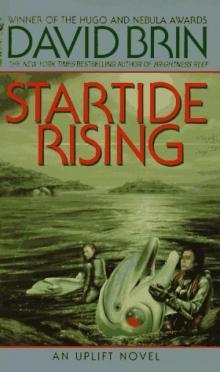 Uplift 2 - Startide Rising
Uplift 2 - Startide Rising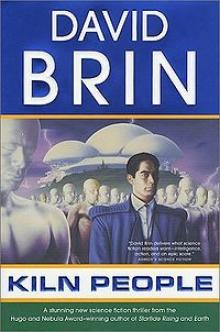 Kiln People
Kiln People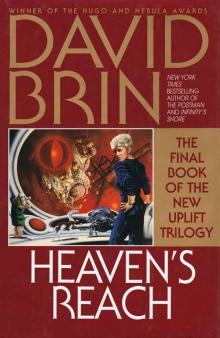 Heaven's Reach u-6
Heaven's Reach u-6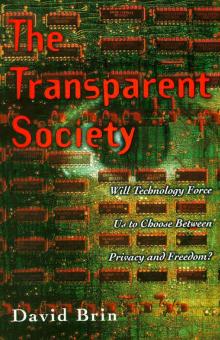 The Transparent Society: Will Technology Force Us to Choose Between Privacy and Freedom?
The Transparent Society: Will Technology Force Us to Choose Between Privacy and Freedom?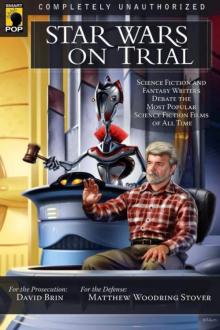 Star Wars on Trial
Star Wars on Trial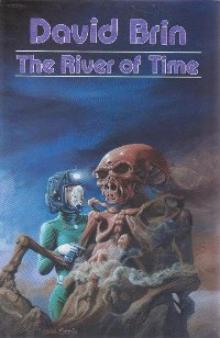 Lungfish
Lungfish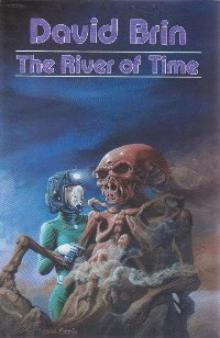 Tank Farm Dynamo
Tank Farm Dynamo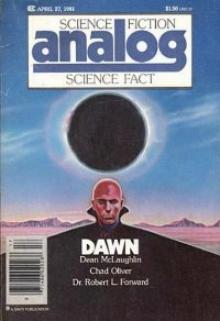 Just a Hint
Just a Hint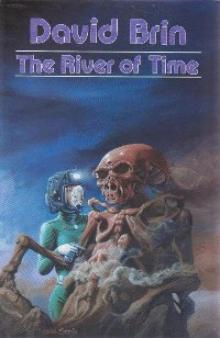 A Stage of Memory
A Stage of Memory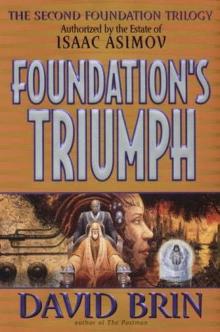 Foundation’s Triumph sf-3
Foundation’s Triumph sf-3 Thor Meets Captain America
Thor Meets Captain America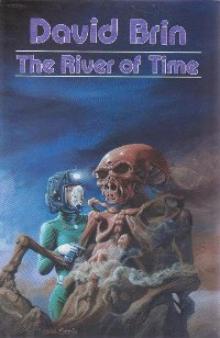 Senses Three and Six
Senses Three and Six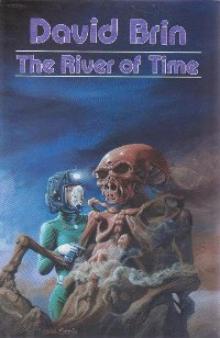 The River of Time
The River of Time Chasing Shadows: Visions of Our Coming Transparent World
Chasing Shadows: Visions of Our Coming Transparent World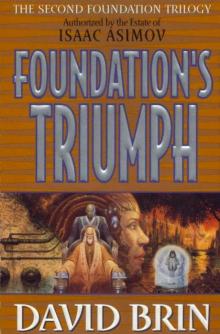 Foundation's Triumph
Foundation's Triumph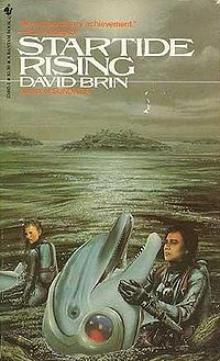 Startide Rising u-2
Startide Rising u-2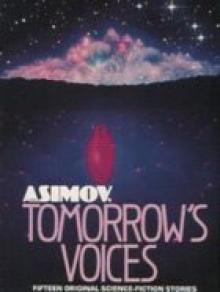 The Fourth Vocation of George Gustaf
The Fourth Vocation of George Gustaf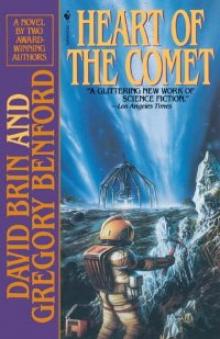 The Heart of the Comet
The Heart of the Comet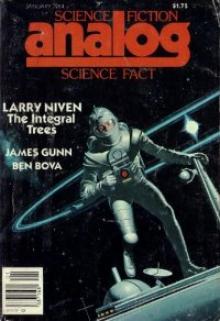 The Crystal Spheres
The Crystal Spheres